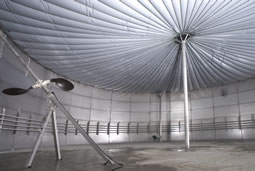The bio-gas plant manufacturer WELtec BioPower GmbH of Vechta, Germany was granted a construction permit to build the world's largest bio-gas plant, which will feed the bio-gas it produces directly into Germany's natural gas network.
 (01.06.2010) Together with some 30 farmers from the area surrounding the 8000-resident town of Könnern, the plant will produce some 30 million cubic meters of raw bio-gas per year. Some 15 million cubic meters of bio-methane can be produced in the bio-gas park between the cities of Halle and Magdeburg. The facility will ferment just over 120,000 tons of substrate annually. "The construction permit signals the beginning of the most ambitious project to date in our company's history," emphasized Jens Albartus, the company CEO. The substrates will consist mainly of renewable resources, such as feed corn, whole-plant ensilage (wheat and rye), as well as liquid cow and pig manure, alfalfa, and Sudan grass.
(01.06.2010) Together with some 30 farmers from the area surrounding the 8000-resident town of Könnern, the plant will produce some 30 million cubic meters of raw bio-gas per year. Some 15 million cubic meters of bio-methane can be produced in the bio-gas park between the cities of Halle and Magdeburg. The facility will ferment just over 120,000 tons of substrate annually. "The construction permit signals the beginning of the most ambitious project to date in our company's history," emphasized Jens Albartus, the company CEO. The substrates will consist mainly of renewable resources, such as feed corn, whole-plant ensilage (wheat and rye), as well as liquid cow and pig manure, alfalfa, and Sudan grass. | Copyright: | © Deutscher Fachverlag (DFV) |
| Quelle: | Entsorga China 01_2010 (Juni 2010) |
| Seiten: | 1 |
| Preis: | € 0,00 |
| Autor: | Thomas Wilkens |
| Artikel nach Login kostenfrei anzeigen | |
| Artikel weiterempfehlen | |
| Artikel nach Login kommentieren | |
Stand der Pumpspeicher in Deutschland 2025
© Springer Vieweg | Springer Fachmedien Wiesbaden GmbH (12/2025)
Infolge des Ausbaus der Stromerzeugung aus erneuerbaren Energien ist ein erhöhter Speicherbedarf im Stromverbundnetz notwendig. Hierdurch steigt die Bedeutung von Pumpspeichern als bis auf weiteres einzige Möglichkeit für eine großmaßstäbliche Stromspeicherung.
Pumpspeicherkraftwerke - Empfehlungen zur Verkuerzung und Vereinfachung von Genehmigungsverfahren in Deutschland
© Springer Vieweg | Springer Fachmedien Wiesbaden GmbH (12/2025)
Die Genehmigungsverfahren sind sehr komplex sowie mit hohen Kosten und rechtlichen Unsicherheiten verbunden und dauern oftmals mehr als zehn Jahre.
Revitalisierung des Pumpspeicherwerks Happurg - Sanierung des Oberbeckens
© Springer Vieweg | Springer Fachmedien Wiesbaden GmbH (12/2025)
Im Rahmen der Revitalisierung des Pumpspeicherwerks Happurg haben im September 2024 auch die Arbeiten zur Sanierung des zugehörigen Oberbeckens begonnen.